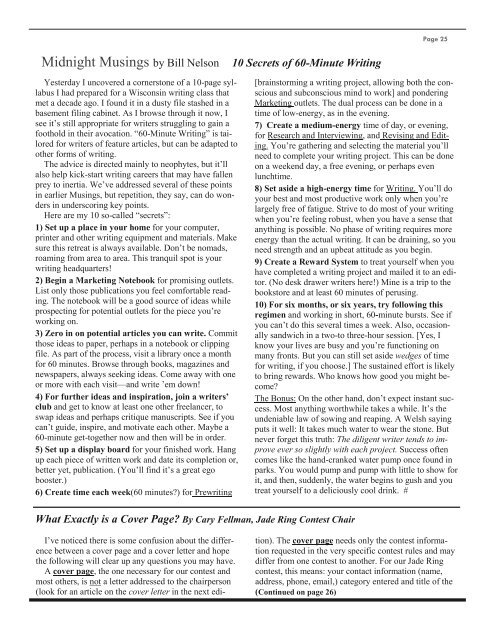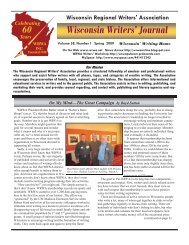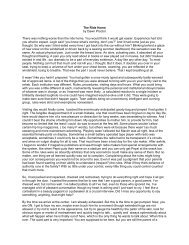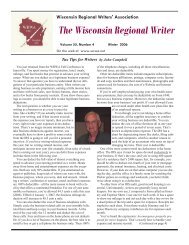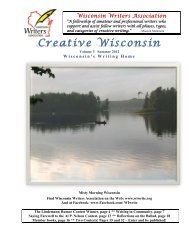2005 Winter - Wisconsin Writers Association
2005 Winter - Wisconsin Writers Association
2005 Winter - Wisconsin Writers Association
- No tags were found...
Create successful ePaper yourself
Turn your PDF publications into a flip-book with our unique Google optimized e-Paper software.
Page 25Midnight Musings by Bill Nelson10 Secrets of 60-Minute WritingYesterday I uncovered a cornerstone of a 10-page syllabusI had prepared for a <strong>Wisconsin</strong> writing class thatmet a decade ago. I found it in a dusty file stashed in abasement filing cabinet. As I browse through it now, Isee it’s still appropriate for writers struggling to gain afoothold in their avocation. “60-Minute Writing” is tailoredfor writers of feature articles, but can be adapted toother forms of writing.The advice is directed mainly to neophytes, but it’llalso help kick-start writing careers that may have fallenprey to inertia. We’ve addressed several of these pointsin earlier Musings, but repetition, they say, can do wondersin underscoring key points.Here are my 10 so-called “secrets”:1) Set up a place in your home for your computer,printer and other writing equipment and materials. Makesure this retreat is always available. Don’t be nomads,roaming from area to area. This tranquil spot is yourwriting headquarters!2) Begin a Marketing Notebook for promising outlets.List only those publications you feel comfortable reading.The notebook will be a good source of ideas whileprospecting for potential outlets for the piece you’reworking on.3) Zero in on potential articles you can write. Committhose ideas to paper, perhaps in a notebook or clippingfile. As part of the process, visit a library once a monthfor 60 minutes. Browse through books, magazines andnewspapers, always seeking ideas. Come away with oneor more with each visit—and write ’em down!4) For further ideas and inspiration, join a writers’club and get to know at least one other freelancer, toswap ideas and perhaps critique manuscripts. See if youcan’t guide, inspire, and motivate each other. Maybe a60-minute get-together now and then will be in order.5) Set up a display board for your finished work. Hangup each piece of written work and date its completion or,better yet, publication. (You’ll find it’s a great egobooster.)6) Create time each week(60 minutes?) for Prewriting[brainstorming a writing project, allowing both the consciousand subconscious mind to work] and ponderingMarketing outlets. The dual process can be done in atime of low-energy, as in the evening.7) Create a medium-energy time of day, or evening,for Research and Interviewing, and Revising and Editing.You’re gathering and selecting the material you’llneed to complete your writing project. This can be doneon a weekend day, a free evening, or perhaps evenlunchtime.8) Set aside a high-energy time for Writing. You’ll doyour best and most productive work only when you’relargely free of fatigue. Strive to do most of your writingwhen you’re feeling robust, when you have a sense thatanything is possible. No phase of writing requires moreenergy than the actual writing. It can be draining, so youneed strength and an upbeat attitude as you begin.9) Create a Reward System to treat yourself when youhave completed a writing project and mailed it to an editor.(No desk drawer writers here!) Mine is a trip to thebookstore and at least 60 minutes of perusing.10) For six months, or six years, try following thisregimen and working in short, 60-minute bursts. See ifyou can’t do this several times a week. Also, occasionallysandwich in a two-to three-hour session. [Yes, Iknow your lives are busy and you’re functioning onmany fronts. But you can still set aside wedges of timefor writing, if you choose.] The sustained effort is likelyto bring rewards. Who knows how good you might become?The Bonus: On the other hand, don’t expect instant success.Most anything worthwhile takes a while. It’s theundeniable law of sowing and reaping. A Welsh sayingputs it well: It takes much water to wear the stone. Butnever forget this truth: The diligent writer tends to improveever so slightly with each project. Success oftencomes like the hand-cranked water pump once found inparks. You would pump and pump with little to show forit, and then, suddenly, the water begins to gush and youtreat yourself to a deliciously cool drink. #What Exactly is a Cover Page? By Cary Fellman, Jade Ring Contest ChairI’ve noticed there is some confusion about the differencebetween a cover page and a cover letter and hopethe following will clear up any questions you may have.A cover page, the one necessary for our contest andmost others, is not a letter addressed to the chairperson(look for an article on the cover letter in the next edi-tion). The cover page needs only the contest informationrequested in the very specific contest rules and maydiffer from one contest to another. For our Jade Ringcontest, this means: your contact information (name,address, phone, email,) category entered and title of the(Continued on page 26)


